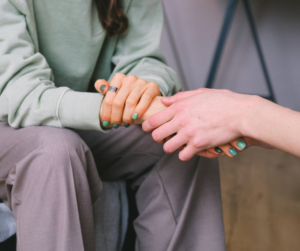Mental Health Tools For Surviving The Coronavirus
Our lives have drastically changed over the past few years. I know I had more than one conversation with patients a short time ago, encouraging them to not worry too much about things.
While I still stand by the not getting caught up in the waves of panic that are fueled by social media and the news, times have definitely changed. With continuously empty grocery store shelves, businesses closing, strict physical distancing recommendations, and now having a mandated stay-at-home directive in the state of Maryland, the level of fear has understandably escalated.
As I’ve discussed before, stress, and its colleague fear, depress immune system function. So instead of writing about ways to support your immune system, I thought it would be more practical to talk about the elephant in the room: mental health.
Even I am not immune to succumbing to the stress of this situation. There are so many unknowns: when will this end? Will this affect (or worse, permanently injure or kill) someone I care about? Will I lose my job or will my small business have to shut down? Will I go into debt? The questions are endless.
I feel like one of the lucky ones in that we’re considered an essential business and are still able to offer virtual visits but even still, we’ve had a significant drop in business and these worries enter my mind.
With all the unknowns and this unprecedented time in modern history, I wanted to share with you some mental health tools to help weather the coronavirus storm.
That being said, a portion of this list is more relevant to people that have had life slowing down in some way but for some of us, perhaps life is more hectic than ever. You went from working full-time to now working full-time at home (which has its own share of challenges) and having to entertain your kids since they are no longer in school.
Incorporate however many or few that seem applicable and realistic to your current situation. This list is in no particular order.
- You are not alone
Everyone is feeling some level of fear right now. Sometimes it can feel like this is only impacting you to this degree and others seem to be adapting just fine. If what I shared above is any indication, we are all feeling it. Know that we are all suffering in some way right now and you are not alone in what you’re experiencing.
2) Feel and express your fears
This relates to #1 but it is important for mental health and healing to allow yourself to feel and express your fears. What we resist, persists so to help more through all the emotions that come up over the next few weeks or months, allow them to be seen or heard. Even if it is just dipping a toe into the pool of fear that is lurking underneath.
If voicing your emotions feels like too much at this point, instead try to identify them in your body. Where do you feel this fear? Is it a tightness in your chest? A heaviness in your heart? Just bring some awareness to these feelings, either by naming them out loud or noticing where you feel them physically.
3) Maintain (or tweak) your routine
Studies have shown the mental health benefits of having some kind of routine. With all of the changes of kids at home, working from home (or perhaps no work at all), or limiting social interactions, your normal routine is likely greatly disrupted.
All my research about routines (yes, I’m a nerd about productivity and habits) shows the that simple ones are easier to maintain yet still have great benefits. Pick either morning or evening and just find three simple things that you can do anywhere. So things like having a cup of tea or coffee, stretching, reading, etc. Keeping your morning and/or evening routine light and portable means it is easy to do when life gets crazy (like now) and it can be done under any conditions (like when you’re stuck at home or in the future when we get to travel again).
My morning routine is listening to an uplifting podcast for 10-15 minutes while I knit, reading some spiritual work, and journaling. Simple, portable, and grounding. You can even start with just one thing as your routine to get into the habit and build up from there.
4) Stick to the basics
With life being all out of whack (what day is it again?), it is important to stick to the basics. Making your bed, taking showers, getting dressed, drinking water, or sticking to a regular bedtime. These may seem like small things but if you find yourself feeling down or forgetting when’s the last time you showered or changed out of PJs, get back to basic self-care practices.
5) Get creative
Take this forced slow down of life as an opportunity to be more creative. Perhaps you used to draw or write music. Or maybe you’ve wanted to share with your kids how to make collages or a dance routine. You could even apply this to cooking. Challenge yourself to get creative with what you can find at the grocery store and make up a new recipe.
6) Use your resources
Resources are something I recommend to a lot of my patients, even under normal circumstances. Resources are essentially things (or people, places, etc) that bring you joy. They can be simple like lighting candles or playing music, or a little more time intensive like taking a bath or going for a walk with your dog.
Make your resources list and post it somewhere visible as a reminder to you to incorporate one or a few things from your list every day.
7) Keep physical distance but stay social
While limiting physical contact with others is required at this point, it doesn’t mean you can’t still be social. Thanks to technology, you can have a virtual happy hour with your friends, or use this as an opportunity to reconnect with friends or family members you haven’t spoken to for a while.
8) More hugs at home
If you are lucky enough to be facing this stay-at-home order with your loved ones at home, find more ways to physically connect. Physical touch has been shown to reduce cortisol, our main stress hormone, so don’t be afraid to ask for a few more hugs or hand-holding right now. And pets count too!
9) Reduce news and social media consumption
We already know that there is a lot of misinformation due to the nature of the internet and social media. With everyone scrambling to figure out how to combat this virus fast, that misinformation is on steroids.
A habit I changed some time ago that has made a big difference was to not start my day with news. I used to listen to a news podcast each morning while I would knit (see #3) but found that I was creating a more stressful morning for myself. Now I tune in when I feel like I want to know what’s going on and am in an emotionally stable place to deal with what I hear. I have no problem admitting that I can be weeks behind on the latest “news” and I’ve only experienced benefits from this avoidance.
10) Spend more time in nature
Just because we have to maintain physical distance doesn’t mean we can’t connect to other things. While the pandemic’s timing couldn’t be worse for many people, thankfully nature goes on unaffected.
Rely on the constant that is nature during this unusual time. Go out for a walk, start or tend to your garden, or even just start nurturing a single plant. Spending time in nature has been shown to reduce stress so get more nature in your life. Even if it’s as simple as staring out a window.
11) Don’t forget to move
With spending more time at home, it can be easy to get used to the habit of being more sedentary. Whether you’re able to work from home or are not working at all, taking breaks for movement throughout the day is important for mental health.
Try taking a brief walk after meals, do a few minutes of light stretching or yoga, or even a full hour-long workout. Lots of yoga studios and gyms are offering free online classes to help keep people motivated. And there’s always YouTube. Don’t be afraid to start small. Or even try setting an alert on your phone to remind you to move throughout the day.
12) Learn something new
Choose to see staying at home as a chance to learn something new that you didn’t have time for before. Just like with gyms, lots of online classes are being offered at discounted rates or even free. So whether it’s a new language or craft skill (I’m a huge personal fan of knitting), use this time as an opportunity to find a new passion.
13) Declutter and clean
I have always believed there is a connection between your environment and mental health. And some research even supports the idea that a clutter-free home improves mental health. It can feel overwhelming to completely overhaul your house so I like the step-by-step approaches offered from The Minimalists and Be More With Less.
The Minimalists suggest making a game out of decluttering. At the beginning of the month, start with just one item to eliminate. The second day of the month, find two items to get rid of, and so on. Play it with a friend and share pictures of what you’re letting go of.
Courtney from Be More With Less has several ideas of how to start decluttering from picking one drawer to do a decluttering burst by trying to get rid of as many items as you can in one hour. Whatever your preferred method, even just cleaning out one drawer or making space on one countertop can make us feel physically and emotionally lighter.
And as for cleaning, well, it is Spring. Use similar methods as mentioned above. Just start with one room, one area, or one project and work your way from there.
14) Don’t be afraid to ask for help
This is a trying time for so many reasons. But as I mentioned in #1, you are not alone. It is ok to ask for help from your family and friends. Whether that’s emotional and mental help, a chance to share your fears with someone else and get it off your chest. Or even financial help. Banks and other financial institutions are doing what they can to support people financially or offer some relief during this time.
And if you’re a fellow small business owner, consider applying for the relief loans offered (which will hopefully be refunded soon) or ask your customers for help in the form of buying gift cards.
Or consider seeking out professional help. Counselors are considered essential and offering telehealth visits to provide any support you need. The point is, it never hurts to ask and in fact, the response just might surprise you.
15) Play “what if”
If you find yourself constantly worrying or going down the road of catastrophizing everything, follow in Tim Ferris’ footsteps and play “what if”. A variation on one of his practices is to dig into your fears more and think “Ok, what if I lost my job, what’s the worst that could happen?” For each of the scenarios you can imagine, come up with ideas of what you could do to remediate it.
While it may sound like a depressing way to use your imagination, sometimes the act of thinking through how you could handle the “what ifs” leaves you feeling more empowered in the end, whether or not these things actually come to pass.
16) Practice gratitude
It is easy to get caught up in all the things that are going wrong currently and forget what is going right. Even though this has been a difficult time, I have heard from several people who are choosing to the see the blessing in this forced slow down as a time to reconnect with what is truly important, like family and nature.
Personally, it has been quite eye-opening to realize how much stress certain aspects of my business cause and as hard as thing are right now, I am grateful for the opportunity to see life in a different way.
So consider cultivating a practice of gratitude to help bring a new perspective. Or if that feels like too much of a stretch right now, I explain a different gratitude practice here.
Even with this long list, please know that is also ok to do nothing. The world is going through trauma right now so it’s also ok to recognize when you’ve had enough for the day and be gentle with yourself.
How has this experience been for you? What tools have you been using or what tools would you like to try adding? Let’s make this a fully comprehensive list (I even added to the list as I was typing) so please comment below what has been helpful for you!
 Previous Post
Previous Post

